Stallone’s 1993 film eerily foreshadowed the 2020’s
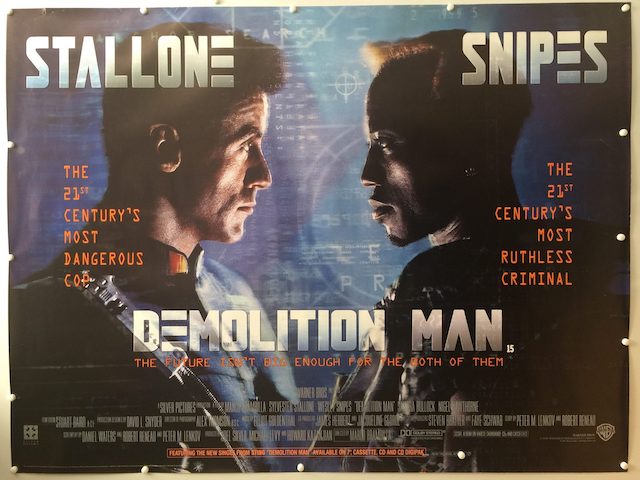 Sylvester Stallone’s 90s movie Demolition Man featured a star-studded cast and was a huge hit with viewers at the time.
Sylvester Stallone’s 90s movie Demolition Man featured a star-studded cast and was a huge hit with viewers at the time.
And the 1993 sci-fi film has taken on a new lease of life in recent years as eager fans re-watching the epic are convinced it predicted the future.
Viewers have noticed a whole host of eerie similarities between the futuristic pacifist utopia San Angeles – formerly Los Angeles – and the 2020s.
 The action movie sees John Spartan (Sylvester) and crime lord Simon Phoenix (Wesley Snipes) sentenced to frozen incarceration known as ‘CryoPrison’ in 1996.
The action movie sees John Spartan (Sylvester) and crime lord Simon Phoenix (Wesley Snipes) sentenced to frozen incarceration known as ‘CryoPrison’ in 1996.
But 36 years later in 2032, Phoenix is revived on parole and goes on a killing spree, with Spartan then teaming up with police officer Lenina (Sandra Bullock) to catch him.
Eagle-eyed fans noticed a disease spreading in San Angeles bears more than one similarity to the Covid-19 pandemic, while its tech advancements were also very accurate.
From a lack of toilet paper to the use of video calls and no hand shaking, we look at all the reasons fans think Demolition Man predicted the future.
NO HAND SHAKING
Demolition Man sees the spread of a disease in San Angeles which saw the fictional city ban all forms of physical contact to stop the spread.
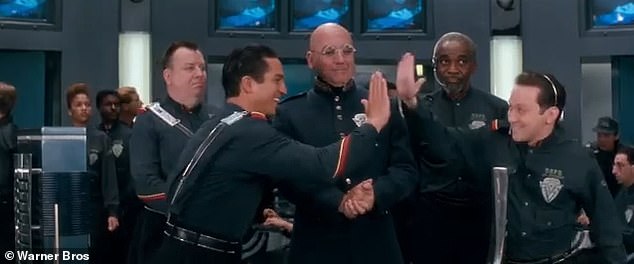 Instead of the traditional handshake, one scene sees two characters instead do a contact-free high-five.
Instead of the traditional handshake, one scene sees two characters instead do a contact-free high-five.
The grinning pair enthusiastically go forward to high-five but halt their hands before making contact, instead moving them around in a circle in the air.
In another scene, Spartan attempts to shake someone’s hand, but is warned by Lenina: ‘We’re not used to physical contact greetings.’
The lack of physical contact eerily mirrored present-day society, when public health experts urged people to stop shaking hands early on in the Covid-19 pandemic.
The guidance was given in an effort to combat the spread of the virus and people instead starting adopting elbow bumps as a polite greeting instead.
NO TOILET PAPER
One scene in the comedy movie also sees Spartan hilariously question Lenina on why there is no toilet roll in the bathroom.
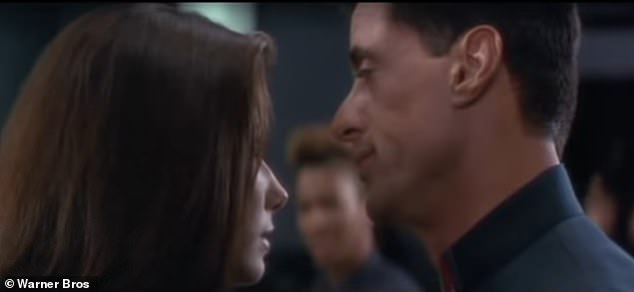 He whispers in her ear: ‘Look, I don’t know if you guys know it but you’re out of toilet paper.’
He whispers in her ear: ‘Look, I don’t know if you guys know it but you’re out of toilet paper.’
But after another character shares his confusion, Lenina confirms that they no longer have toilet paper, but instead use three seashells.
A laughing Lenina tells her colleagues: ‘They used handfuls of wadded paper back in the 20th.’
Though toilet paper has not been eradicated from society, viewers pointed out that it bore similarities to the toilet paper shortages amid the Covid crisis.
Early on in the pandemic, people began panic buying toilet paper in bulk amid fears supermarkets would run out during lockdown, leaving shelves completely bare.
USE OF VIDEO CONFERENCING
Demolition Man also introduced the use of video conferencing, and it is used as a regular form of communication in San Angeles.
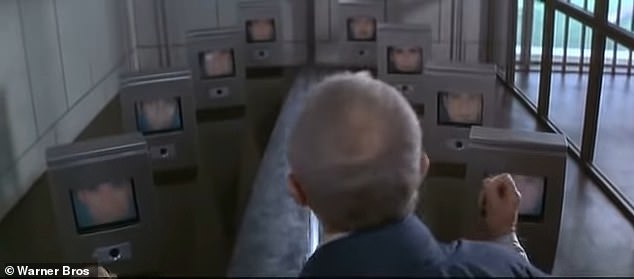 One scene sees Dr. Raymond Cocteau (Nigel Hawthorne) talking to a group of people at a board meeting but is communicating with them through a video call.
One scene sees Dr. Raymond Cocteau (Nigel Hawthorne) talking to a group of people at a board meeting but is communicating with them through a video call.
He is seen sitting at the head of the table while large grey computers are placed where the members of the meeting would normally sit.
The computers turn around the room to follow Dr Cocteau as he speaks, with the participants faces being shown on the screens.
It also predicted the use of iPads and iPhones as Lenina is seen appearing on a video call on a silver tablet-like computer, hinting at the technological advancement to come.
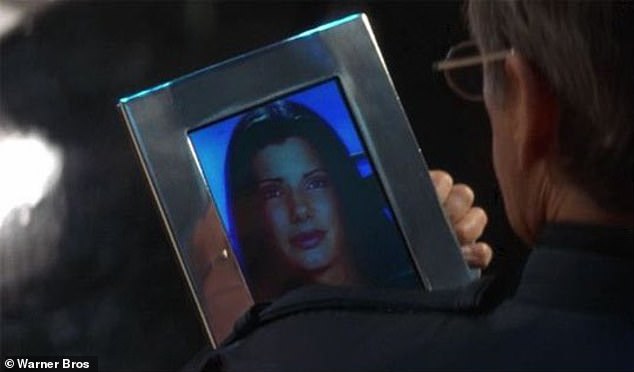 Though the movie’s version of video conferencing is slightly bulker than real life, it eerily predicted the use of the technology in everyday communication.
Though the movie’s version of video conferencing is slightly bulker than real life, it eerily predicted the use of the technology in everyday communication.
During the Covid pandemic, businesses became reliant on video conferencing software, such as Zoom, to communicate with its employees.
As staff were forced to work-from-home during lockdown, bosses instead turned to video calls as a way to still host team meetings and speak face-to-face with staff.
Doctors appointments and school lessons were also hosted via video conferencing during the pandemic, with the technology still being very present in society.
SELF-DRIVING CARS
Another technological advancement that proved very accurate was the introduction of self-driving cars.
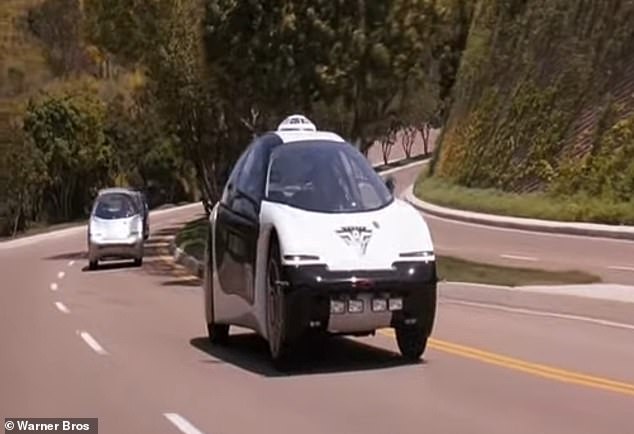 In the movie, Lenina is seen sitting in her self-driving police car as it navigates itself, while she is on a video call to her colleagues.
In the movie, Lenina is seen sitting in her self-driving police car as it navigates itself, while she is on a video call to her colleagues.
Though the introduction of such an invention might have seemed very futuristic at the time, it is now a concept not so far out of reach.
Google has led the way with self-driving cars after launching spin-off Waymo, which has been working on building self-driving minivans and testing out the vehicles.
Waymo started working on autonomous vehicles in 2009, and launched a trial of the technology in Phoenix, which has already been marred by attacks on its vehicles.
Meanwhile, Elon Musk’s company Tesla have also built an array of self-driving vehicles with ‘autopilot functions’ and many have taken to the road.
By the end of last year, Tesla had rolled out the ‘full self-driving’ feature to over 285,000 people in North America, according to the company.
However, Teslas accounted for almost 70 per cent of 329 crashes in which advanced driver assistance systems were involved, as well as a majority fatalities and serious injuries associated with them.
Though it might be years before the use of such cars are widespread, it is an invention that has been heavily invested into and tested out in recent years.
ARNOLD SCHWARZENEGGER’S POLITICAL CAREER
Arnold Schwarzenegger was a popular actor in the 1990s but Demolition Man successfully predicted his future political career.
 In a scene from the film, Spartan is seen riding in a car with Lenina when she reveals she had been looking at some newsreels from the Schwarzenegger Library.
In a scene from the film, Spartan is seen riding in a car with Lenina when she reveals she had been looking at some newsreels from the Schwarzenegger Library.
To which Spartan replies in shock: ‘The Schwarzenegger Library?‘
And Lenina confirms: ‘Yes the Schwarzenegger Presidential Library. Wasn’t he an actor when you…‘
But interrupting, Spartan asks: ‘Stop he was President?‘
Lenina says: ‘Yes! Even though he was not born in this country, his popularity at the time caused the 61st amendment which…,’ but Spartan interrupts her again, saying he doesn’t ‘want to know‘.
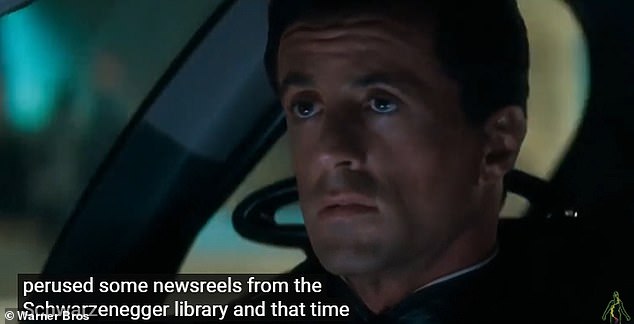 Though Arnold has not become President of the United States, he did pursue a career in politics just years later in 2003.
Though Arnold has not become President of the United States, he did pursue a career in politics just years later in 2003.
He served as the 38th governor of California between 2003 and 2011 and has previously shared his desire to run for President.
Arnold, an Austrian native, became a naturalized citizen in 1983 and said he would have run against Hilary Clinton instead of Donald Trump if he could have.
‘If I’d been born in America, I would’ve run,’ he told Adweek in 2016. ‘Because now? This was a very good time to get in the race.’
VOICE-ACTIVATED TECHNOLOGY
In the fictional futuristic society, a whole host of appliances from lights to cars use voice-activated technology.
Residents are able to turn their lights on and off and work an array of technology using only their voices, much like our own present-day society.
Now, virtual assistant Siri and the Amazon Alexa both listen to voice commands before delivering audio responses for the user.
They are just two flashy devices that use voice commands to function and are sure to be the first in a long line of such inventions.
Written by Kate Dennett for The Daily Mail ~ April 9, 2023
